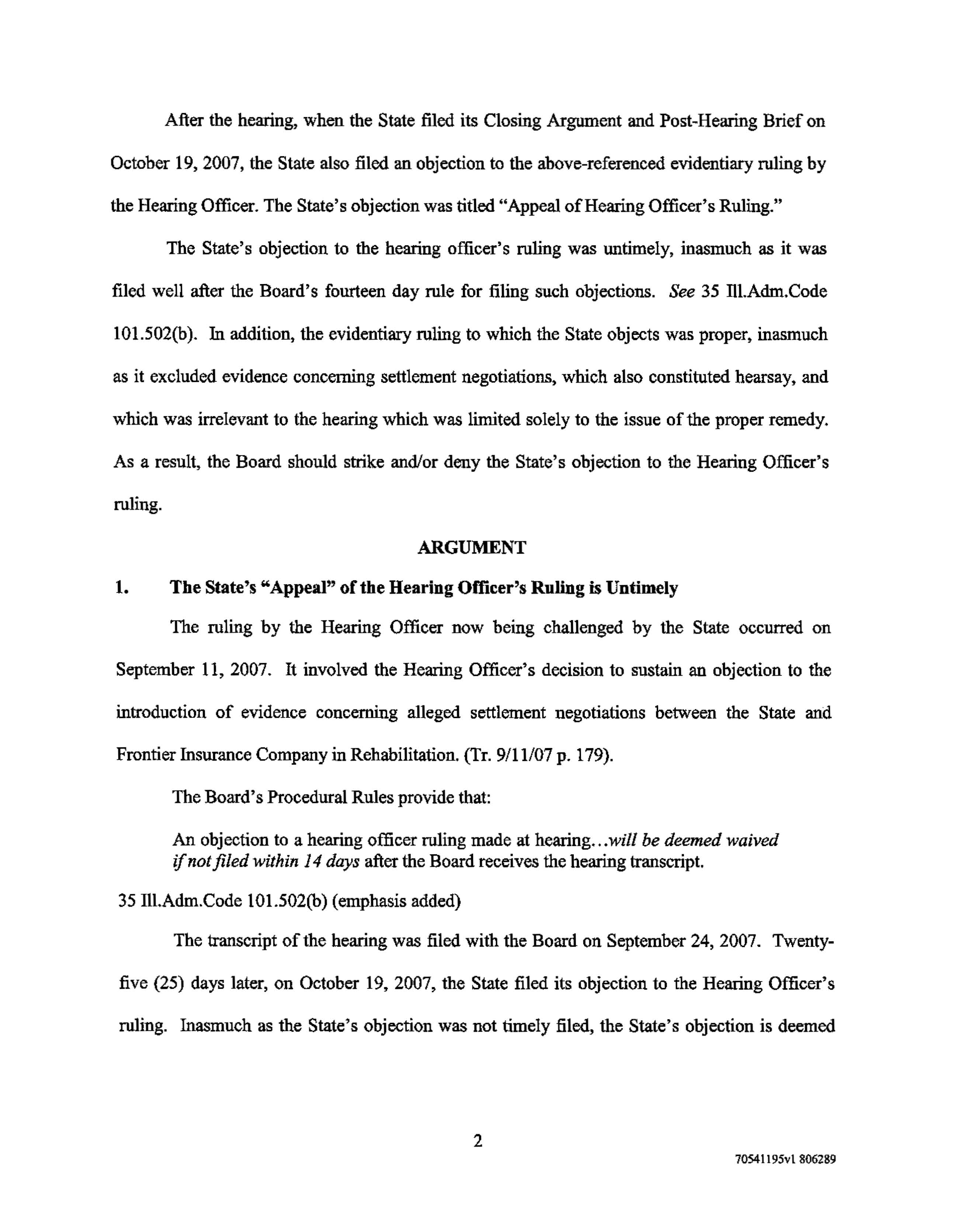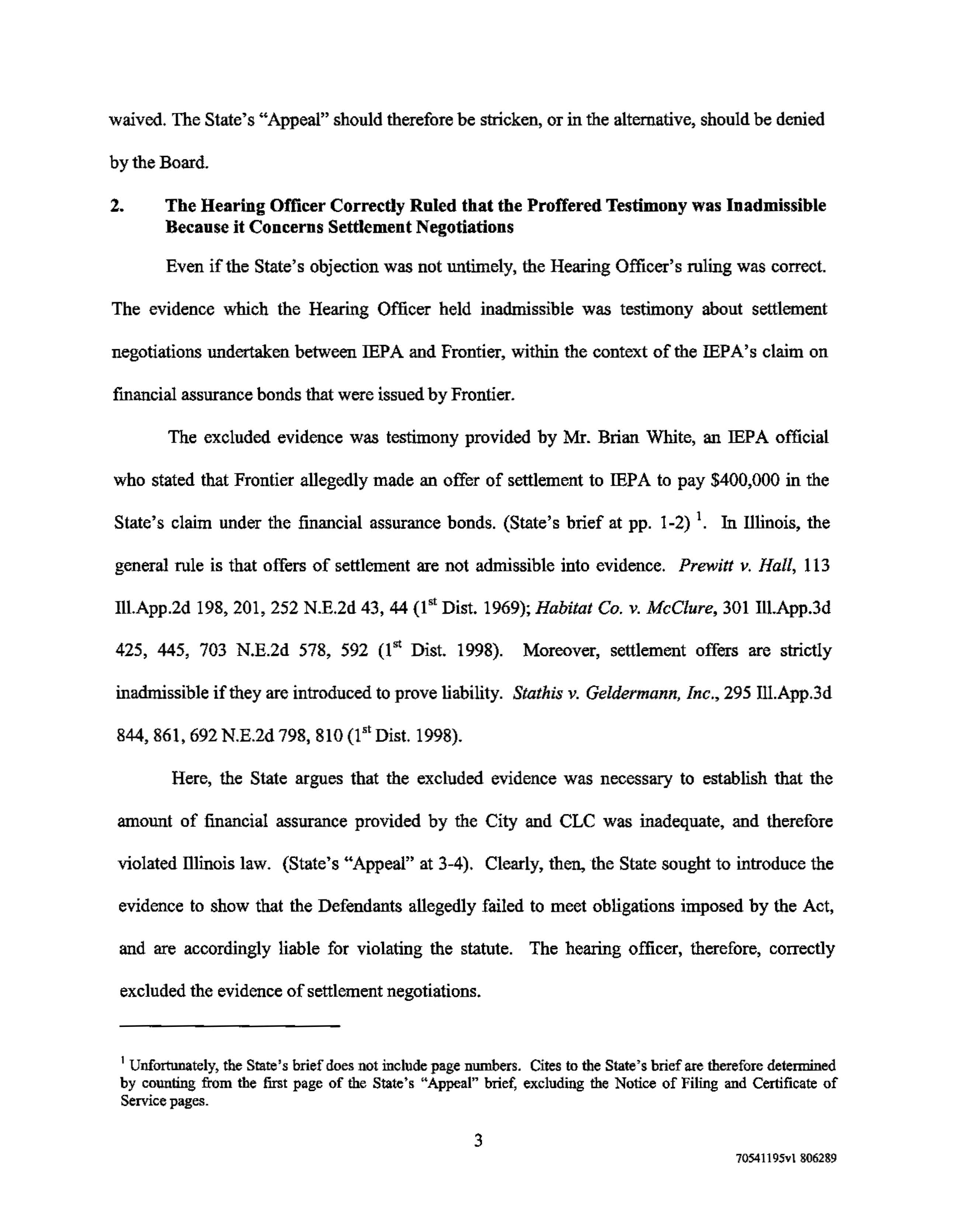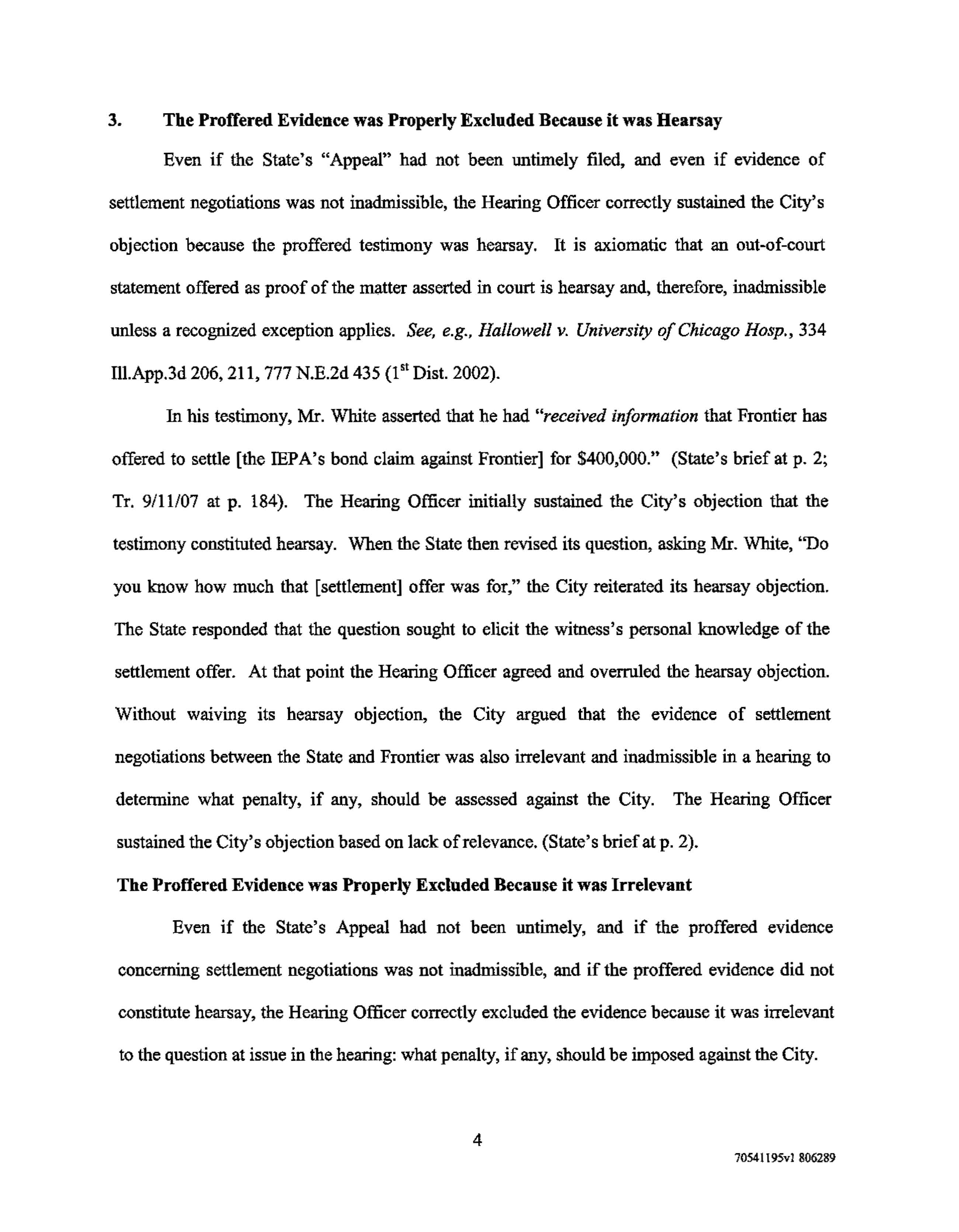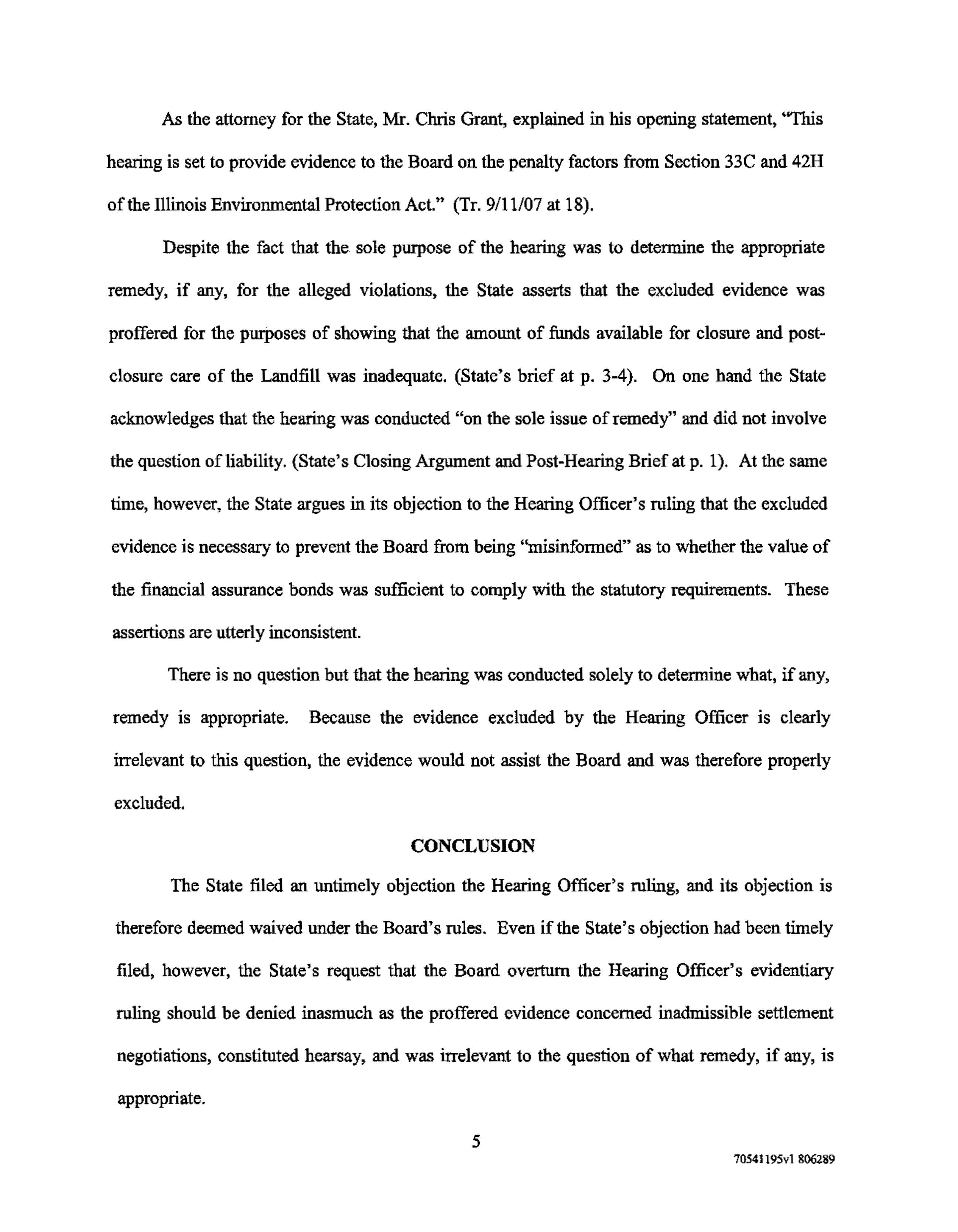ILLlNOIS POLLUTION CONTROL BOARD
PEOPLE OF THE STATE OF ILLlNOIS,
ex
)
reI.
LISA MADIGAN, Attorney General ofthe
)
State
of lllinois,
)
)
Plaintiff,
)
)
v.
)
)
COMMUNITY LANDFILL CO., an lllinois
)
Corporation, and the CITY OF MORRIS, an
)
nlinois Municipal Corporation,
)
Defendants.
NOTICE OF FILING
TO: SEE ATTACHED SERVICE LIST
PCB 03-191
(Enforcement - Land)
PLEASE
TAKE NOTICE that on November 2, 2007, we electronically filed with the
Clerk
of the lllinois Pollution Control Board, City's Response to the State's Appeal of the
Hearing Officer'sRuling, a copy
of which is attached hereto and hereby served upon you.
Dated:
November
2, 2007
Charles F. Heisten
Richard
S. Porter
Hinshaw
& Culbertson LLP
100 Park Avenue
P.O. Box 1389
Rockford, IL 61105-1389
815-490-4900
Scott M. Belt
& Associates, P.C.
105 East Main Street #206
Morris, IL 60450
(815) 941-4675
Respectfully
submitted,
On behalf ofthe CITY OF MORRIS
70S3S4711vl 806289
Electronic Filing - Received, Clerk's Office, November 2, 2007
AFFIDAVIT OF SERVICE
The undersigned, pursuant to the provisions of Section 1-109 ofthe lllinois Code of Civil
Procedure, hereby under penalty of perjury under the laws of the United States of America,
certifies that
on November 2,2007, she caused to be served a copy ofthe foregoing upon:
Mr. Christopher Grant
Mark LaRose
Assistant Attorney General
Clarissa Grayson
Envirornnental Bureau
LaRose
&
Bosco, Ltd.
69
W. Washington St., Suite 1800
200 N. LaSalle, Suite 2810
Chicago, TIL 60602
Chicago,
IL
60601
Mr. John
T. Therriault, Assistant Clerk
Bradley Halloran
Illinois Pollution Control Board
Hearing Officer
100 W. Randolph, Suite 11-500
lllinois Pollution Control Board
Chicago, IL 60601
100 W. Randolph, Suite 11-500
(via electronic filing)
Chicago, TIL 60601
Mr. Scott Belt
Jennifer
A.
Tomas
Scott
M.
Belt
&
Associates, P.C.
Assistant Attorney General
105 East Main Street
Environmental Bureau
Suite 206
69 W. Washington Street, Suite 1800
Morris,
IL 60450
Chicago,
a 60602
A copy
of the same was enclosed in an envelope in the United States mail at Rockford, Illinois,
proper postage prepaid. before the hour of5:00 p.m., addressed as above.
HINSHAW
& CULBERTSON
100 Park Avenue
P.O. Box 1389
Rockford, IL 61105-1389
(815) 490-4900
1041S200vl 806289
PCB No. 03-191
(Enforcement~Land)
BEFORE THE ILLINOIS POLLUTION CONTROL BOARD
PEOPLE OF THE STATE OF ILLINOIS,
ex
)
reI.
LISA MADIGAN, Attorney General ofthe
)
State
ofIllinois,
)
)
Plaintiff,
)
)
~
)
)
COMMUNITY LANDFILL CO., an Illinois
)
Corporation, and the CITY OF MORRIS, an
)
Illinois Municipal Corporation,
)
)
Defendants.
)
CITY'SRESPONSE TO THE STATE'SAPPEAL OF THE
HEARING OFFICER'SRULING
NOW COMES the Defendant, CITY OF MORRIS, an illinois Municipal Corporation, by
and through its attorneys, and in opposition
to
the State'sAppeal of the Hearing Officer'sRuling
states as follows:
BACKGROUND
The underlying proceeding at issue is an enforcement action involving allegations that the
City
of Morris ("the City") and its co-defendant, Community Landfill Company, Inc. ("CLC")
violated Section 5/21 (d)(2) ofthe Dlinois Environmental Protection Act, and Sections 811.700(f)
and 811.712
of the Board's Financial Assurance Regulations, for which hearings were held on
September 10,
II, and 12,2007. The hearings were held for the purpose of determining what
penalty,
if any, should be assessed against the City and CLC.
On September 11, 2007, the Hearing Officer sustained an objection
by the City to
evidence concerning a settlement offer which was allegedly made
by Frontier Insurance
Company in connection with a surety bond claim which the State
has
brought against Frontier.
70541195v\ 806289
After the hearing, when the State filed its Closing Argument and Post-Hearing Brief on
October 19, 2007, the State also filed an objection to the above-referenced evidentiary ruling by
the Hearing Officer. The State'sobjection was titled "Appeal ofHearing Officer'sRuling."
The State's objection to the hearing officer's ruling was Wltimely, inasmuch as
it was
filed well after the Board's fourteen
day rule for filing such objections.
See
35 TIl.Adm.Code
101.502(b).
In addition, the evidentiary ruling to which the State objects was proper, inasmuch
as it excluded evidence concerning settlement negotiations, which also constituted hearsay, and
which was irrelevant to the hearing which was limited solely to the issue
of the proper remedy.
As a result, the Board should strike and/or deny the State's objection to the Hearing Officer's
ruling.
ARGUMENT
1.
The State's"Appeal" of the Hearing Officer'sRuling
is
Untimely
The ruling by the Hearing Officer now being challenged by the State occurred on
September 11, 2007.
It
involved the Hearing Officer's decision to sustain an objection to the
introduction
of evidence concerning alleged settlement negotiations between the State and
Frontier Insurance Company
in Rehabilitation. (Tr.
9/11107
p. 179).
The
Board'sProcedural Rules provide that:
An
objection to a hearing officer ruling made at hearing...
will be deemed waived
if
notfiled within
14
days
after the Board receives the hearing transcript.
35 Ill.Adm.Code 101.502(b) (emphasis added)
The transcript
of the hearing was filed with the Board on September 24, 2007. Twenty-
five (25) days later,
on October 19, 2007, the State filed its objection to the Hearing Officer's
ruling. Inasmuch as the State's objection was
not timely filed, the State's objection is deemed
2
70541195vl806289
waived. The State's"Appeal" should therefore be stricken, or
in
the alternative, should be denied
by the Board.
2.
The Hearing Officer Correctly Ruled that the Proffered Testimony was Inadmissible
Because
it Concerns Settlement Negotiations
Even if the State's objection was not untimely, the Hearing Officer's ruling was correct.
The evidence which the Hearing Officer held inadmissible was testimony about settlement
negotiations undertaken between IEPA and Frontier, within the context
of the IEPA's claim on
fmancial assurance bonds that were issued by Frontier.
The excluded evidence was testimony provided by Mr. Brian White, an IEPA official
who stated that Frontier allegedly made an offer
of settlement to IEPA to pay $400,000 in the
State's claim under the financial assurance bonds. (State's
brief at pp. 1-2) 1. In Illinois, the
general rule is that offers
of settlement are not admissible into evidence.
Prewitt v. Hall,
113
Ill.App.2d 198,201,252 N.E.2d 43,44 (1
st
Dist. 1969);
Habitat Co. v. McClure.
301 Ill.App.3d
425, 445, 703 N.E.2d 578, 592 (1
st
Dist. 1998). Moreover, settlement offers are strictly
inadmissible if they are introduced to prove liability.
Stathis v. Geldermann, Inc.,
295 IlLApp.3d
844,861,692 N.E.2d 798,810 (lst Dist. 1998).
Here, the State argues that the excluded evidence was necessary to establish that the
amount
of financial assurance provided by the City and CLC was inadequate, and therefore
violated llIinois law. (State's"Appeal" at 3-4). Clearly, then, the State sought to introduce the
evidence to show that the Defendants allegedly failed to meet obligations imposed by the Act,
and are accordingly liable for violating the statute. The hearing officer, therefore, correctly
excluded the evidence of settlement negotiations.
1 Unfortunately, the State's brief does not include page numbers. Cites to the State'sbrief are therefore determined
by counting from the
first page of the State's "Appeal" brief, excluding the Notice of Filing and Certificate of
Service pages.
3
70541195v! 806289
3.
The Proffered Evidence was Properly Excluded Because it was Hearsay
Even if the State's "Appeal" had not been untimely filed, and even if evidence of
settlement negotiations was not inadmissible, the Hearing Officer correctly sustained the City's
objection because the proffered testimony was hearsay.
It
is axiomatic that an out-of-court
statement offered as proof of the matter asserted in court is hearsay and, therefore, inadmissible
unless a recognized exception applies.
See, e.g., Hallowell v. University ofChicago Hasp., 334
1ll.App.3d 206, 211, 777 N.E.2d 435 (1
st
Dist. 2002).
In
his testimony, Mr. White asserted that he had
"received information
that Frontier has
offered to settle [the IEPA's bond claim against Frontier] for $400,000." (State's brief at p. 2;
Tr.
9/11107
at p. 184). The Hearing Officer initially sustained the City's objection that the
testimony constituted hearsay. When the State then revised its question, asking Mr. White, "Do
you know how much that [settlement] offer was for," the City reiterated its hearsay objection.
The State responded that the question sought to elicit the witness's personal knowledge of the
settlement offer. At that point the Hearing Officer agreed and overruled the hearsay objection.
Without waiving its hearsay objection, the City argued that the evidence of settlement
negotiations between the State and Frontier was also irrelevant and inadmissible
in
a hearing to
determine what penalty, if any, should be assessed against the City. The Hearing Officer
sustained the City'sobjection based on lack ofrelevance. (State'sbrief at p. 2).
The Proffered Evidence was Properly Excluded Because it was Irrelevant
Even
if
the State's Appeal had not been untimely, and if the proffered evidence
concerning settlement negotiations was not inadmissible, and if the proffered evidence did not
constitute hearsay, the Hearing Officer correctly excluded the evidence because it was irrelevant
to the question at issue in the hearing: what penalty, if any, should be imposed against the City.
4
70541 I95vl 806289
As
the attorney for the State, Mr. Chris Grant, explained
in
his opening statement, "TItis
hearing is set to provide evidence to the Board on the penalty factors from Section 33C and 42H
of the Illinois Environmental Protection Act." (Tr. 9/11/07 at 18).
Despite the fact that the sole purpose of the hearing was to detennine the appropriate
remedy,
if any, for the alleged violations, the State asserts that the excluded evidence was
proffered for the
purposes of showing that the amount of funds available for closure and post-
closure care
of the Landfill was inadequate. (State's brief at p. 3-4). On one hand the State
acknowledges that the hearing was conducted "on the sole issue
of remedy" and did not involve
the question ofliability. (State's Closing Argument and Post-Hearing Brief at p.
1).
At the same
time, however, the State argues
in
its objection to the Hearing Officer's ruling that the excluded
evidence is necessary to prevent the Board from being "misinformed" as to whether the value of
the financial assurance bonds was sufficient to comply with the statutory requirements. These
assertions are utterly inconsistent.
There is no question but that the hearing was conducted solely to determine what,
if any,
remedy is appropriate. Because the evidence excluded
by the Hearing Officer is clearly
irrelevant to this question, the evidence would not assist the Board and was therefore properly
excluded.
CONCLUSION
The State filed an untimely objection the Hearing Officer)s ruling) and its objection is
therefore deemed waived under the Board'srules. Even if the State's objection had been timely
filed, however, the State's request that the Board overturn the Hearing Officer's evidentiary
ruling should
be denied inasmuch as the proffered evidence concerned inadmissible settlement
negotiations, constituted hearsay, and was irrelevant to the question of what remedy, if any, is
appropriate.
5
70541195v1806289
WHEREFORE, for the reasons set forth above, the Defendant, CITY OF MORRIS, a
Municipal Corporation, respectfully requests that this Board deny the State's "Appeal
of the
Hearing Officer Ruling," and grant such other and further relief as the Board deems appropriate.
CITY OF MORRIS, Defendant
By: HINSHAW
&
CULBERTSON L
Charles F. Helsten
Richard
S. Porter
Hinshaw & Culbertson LLP
100 Park Avenue
P.O. Box 1389
Rockford,
IL 61105-1389
815-490-4900
Scott M. Belt
&
Associates, P.C.
105 East Main Street #206
Morris, IL 60450
(815) 941-4675
6
70541195vI806289
Electronic Filing - Received, Clerk's Office, November 2, 2007





